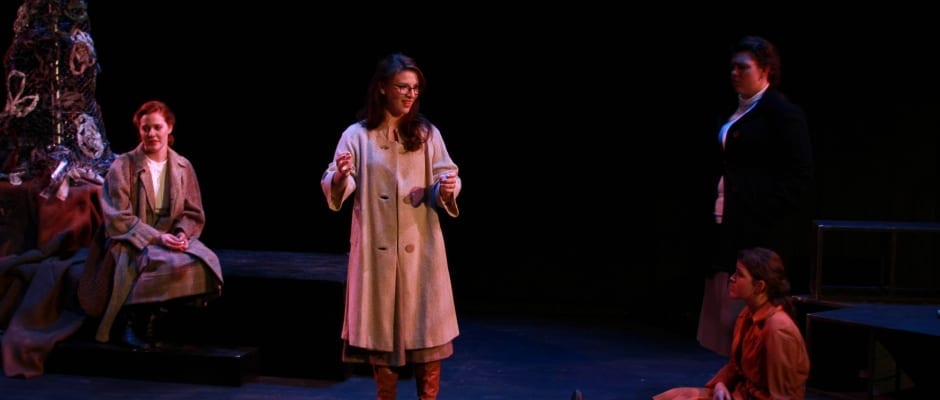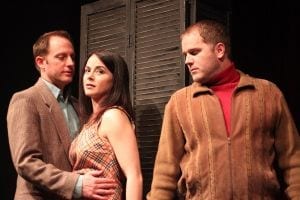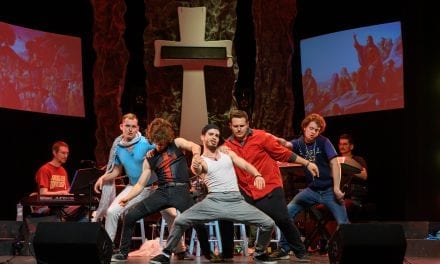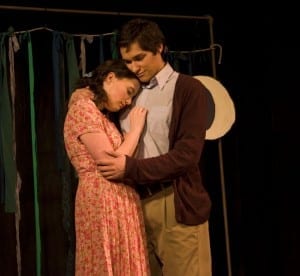MAGNA — Little Women has been one of my favorite books since a friend introduced me to the March sisters in seventh grade. I don’t know how often I’ve read it; it’s one of the few books that always feels familiar, like coming home. It’s a story that never grows old because the Marches are an incredibly real family. Author Louisa May Alcott presents a family dynamic that is relatable and truthful despite the century and a half that separate her from us.
Little Women is the story of four sisters —Meg, Jo, Beth and Amy, aged 16 to 12, respectively—growing up in New England during the Civil War. As the title suggests, as time passes we see them change from girls to women, each enduring her own trials and heartbreaks. The March sisters are a forceful unit; they support and love each other, despite the occasional falling out, and they have no intention of ever being divided.
At the center of the show is Brittany Boynton’s very enthusiastic portrayal of ambitious writer Jo. Her sisters are played by April Henderson (Meg), Lindsay Boucher (Beth) and Halie Lund (Amy) with Emily Alderman as their patient mother (called Marmee). This quintet shares a pleasant rapport, and even enough resemblance, between them on stage to effectively bring the fictional family to life. I had no problem believing they were a family, and those intimate connections were even underlined in the harmonic blending of their voices.
I also enjoyed the performances of the men in the show (contrary to what you might expect, there are a few). I particularly enjoyed the work of Tyler Kofoed, whose Professor Bhaer bumbles and stumbles his Hugh Grant-ish way into your affections. Kofoed’s stiff awkwardness is a nice foil to Boynton’s warmth as Jo, and even their differing heights add to the idea of their mismatched-ness. I found myself smiling whenever Kofoed was on stage, despite the fact that the character is given no room to grow or change within the script.
As much as I love the novel, the musical, despite its Broadway pedigree, is not the strongest adaptation of the story and offers any who perform it a number of challenges. To start, while it’s easy to take the dated language of the novel as sentimental, the musical’s book manages to both over-simplify the plot and over-sweeten the dialogue. Relationships happen because they simply must; the passing of months and years are glossed over; significant events are changed for no explicable dramatic reason. It’s quick and light at best, plodding at its worst.
The production was also slowed by a few technical glitches. Sitting in the audience, I wondered if Jo might have too many costume changes to worry about; while the different outfits are of course nice to have, are they all necessary if they’re slowing things down? The deceptively simple set requires a number of complicated scene changes, and it looked as if there was a literal army changing the scenes backstage. But this army doesn’t hustle; I watched several of them saunter about in the dark. A number of the scenes in the play are quite short, and going to a blackout to completely re-arrange the furniture kills momentum and pace. Pacing is an issue both with the script and with this production. Individual scenes lack a sense of arc—they don’t start and finish, they simply happen, without any sense of import to the overall story—and events feel choppy and disconnected.
I had never been to the Empress Theatre before this weekend. It’s a lovely little space, complete with some interesting quirks. For example, is the stage a thrust, with a false proscenium? A tennis court? Or is it meant to be played in the round? The quirks of the space do make blocking difficult; a great deal of the show, however unintentionally, is performed for the smallest section of the audience. While the size of the space should have helped me feel more closely connected to the Marches, the use of it made me feel more distanced. There are times, however, when director Susan Whiteknight does use the space to her advantage. The upstage entrances, marked by pillars, support an upper level that makes a lovely garret for Jo’s attic scenes. A character from one of Jo’s stories is able to make a heroic entrance; I won’t spoil it, but I laughed for joy when it happened.
Little Women is a story of joy and family, of despair and dreams. It’s a story that is quintessentially American, very much a part of us all. A visit with the Marches is always a pleasure, especially with the holidays fast approaching.





